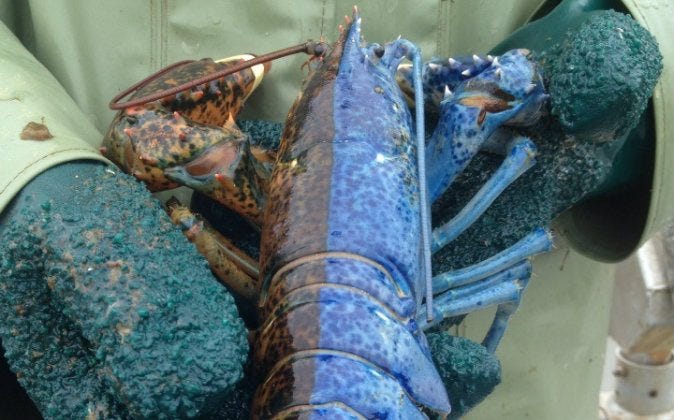The Whippet #164: The son of a cat kills mice
Here's something I've been thinking about: you know when someone gets bit by a shark, usually a surfer, you'll see an interview with them and they're like "I was in their territory not mine, we should respect sharks not fear them, I don't want anyone to hurt sharks, I've actually set up an environmental charity to protect sharks".
All of which is totally the correct attitude.
But traumatised people do not always have the correct attitude, right? Surely there's a surfer out there who's like "fucken drop a nuke in the ocean, I hate sharks now, they took my legs and I want them all to die, even the bonnethead shark, which is only 3 feet long and eats mostly seagrass".
I mean, there must be ONE sharkbite victim out there who hasn't reacted well or rationally. So what happens to them? Does someone... hush them up?
I'm not saying they SHOULD get airtime, but the media loves giving airtime to people who shouldn't get airtime, so why don't we ever hear from them?
Some alternatives to "chip off the old block"
Firstly, changing mediums from stone to wood with "twig off the old branch" which a German (I think? I forget) commenter shared, and of course "the apple doesn't fall far from the tree".
The format of "the son/daughter/child of [animal] [does a thing that animal does]" is a great format that anyone could spin off variants of,* and makes "The child of a snake is a snake" seem kind of uncreative in comparison.
Like many aphorisms, these are not necessarily in actual use, but I mean I don't think anyone is using "Heavens to Betsy!" non-ironically, but we still know the phrase.
* "the son of a spider has eight legs" – this is easy, we can all have our own personal aphorism for how children... should be... distrusted... based on who their parents are? Look that's not the point, they're fun to make up.
Leave a comment / aphorism about animal offspring
Half-male, half-female cardinal
The technical term is "bilateral gynandromorphism" (etymologically: two-sides woman-man-shape). It has an ovary on one side and a testicle on the other (internal as with all male birds).

In gynandromorphism, the different halves of the bird are fertilised by different sperm, and it's developed into a fully united, normally functioning bird, making it quite different from conjoined twins, who are always identical.
They reckon gynandromorph birds might not be that rare – they're just easier to spot in cardinals than, say, sparrows, because the males and females are different colours. (Immediately had the thought to google "gynandromorph peacock" but sadly the only result is some misinfo – this cool-looking peacock is just piebald, not gynandromorphic.)
* Hill is described in different articles as either a "birdwatcher" or a "birder" so I was hugely relieved to see he's also a retired ornithologist, saving me the need to decide between them. As far I can tell, a birder is basically a birdwatcher who tries harder. Like they don't just go "hey let's go for a walk where the nice birds are", they go "I HEARD THERE WAS A NICE BIRD IN A SWAMP 80 KM AWAY SO I GOT UP AT 3 AM TO GO SEE IT."
Here's a bilateral gynandromorphic lobster for you:

God has no need for logic
I really like this quote (for what it says about logic, not for what it says about God):
"God has no need of any arguments, even good ones. All the truths are apparent before God, and He does not need to deduce one from another." – Bob Meyer, logician, 1976
This has nothing to do with faith in god – i.e. he's not saying "we don't need arguments for God", he's saying "God doesn't need arguments for anything".
The purpose and value of logic and deduction is to start from something you do know, to get to something you don't know.
The example they always give in philosophy textbooks is "Socrates is a man. All men are mortal. Therefore Socrates is mortal." If we didn't know whether or not Socrates was mortal, we could figure it out from the first two facts. But an all-seeing, all-knowing God* already knows that Socrates is mortal. He knows everything. He knows all the relationships between all the things. He would never need to deduce any fact from any other fact, because he would already know it.
* you don't have to believe in God to follow this! don't get distracted, militant atheists! This is a hypothetical: if a creature was all-seeing and all-knowing, it would have no use for logic (or maths, or any process by which you figure something out).
There's something quite eerie about that, because I think of "intelligence" as less to do with "knowing a bunch of stuff" and more to do with figuring stuff out in new and uncertain situations. But you only develop skill in that area if you've ever been in an uncertain situation full of unknowns, which an omniscient god never has.
PS Bob Meyer also wrote the tongue-in-cheek Logicians Liberation League Manifesto which is a bit of nerdy fun and probably a lot of insider jokes I'm missing
Whale folklore and religion in Japan
This is an excerpt from a much longer piece that begins with bakekujira (ghost whales) and ends with a 1950s manga artist who believed he was under a whale-related curse.
Hyochakushin – The Drifting Ashore God
In pre-seafaring Japan—before Samurai William brought the secret of keels and ocean-going vessels—fishermen were limited to the coastal waters their small ships could take them too. They eked out a subsistence living harvesting what was in reach. But every now and then, the oceans would deliver a bounty beyond imagination.
Whales would sometimes come inland, or beach themselves on the shore. Fishermen hunted these whales in a practice called Passive Whaling, using harpoons to kill the whale that was trapped in the shallows. This was a rare and auspicious event—a single whale provided vast amounts of meat and resources for the village, and seemed like a gift from the gods. And the whale itself was only a piece of the bounty. Whales often came in following larges schools of fish, so their arrival meant an abundance of sea life beyond the leviathan itself. The arrival of a whale could save a village teetering on the edge of starvation and ruin. It was mana from the oceans.
Like modern Cargo Cults, the villagers could not understand from where or why the whale came in to shore. They only knew that a whale meant wealth and rare full stomachs. Whales were considered to be embodied deities (神体; shintai), and whale religions sprang up in coastal villages, called Hyochakushin (漂着神; Drifting Ashore God) or Yorikami Shinkyo (寄り神信仰; The Religion of the Visiting Kami).
** Note, a reader tells me Yorikami Shinkyo (寄り神信仰) is more probably pronounced as Yorishin Shinkō
The Whale and Ebisu
These original whale cults were primitive. The people praying generally had one request—send more whales. But in time they evolved. Like many religions, the Whale Cults in Japan were built on a portion of respect and gratitude and a portion of fear. Because whaling—even Passive Whaling—was a dangerous operation, some whale religions also saw in whales the ability to be malevolent gods, and prayed to appease their spirits and assuage their wrath. Bad storms of poor catches could mean an angry whale god, and nobody wanted that.
In time, these whale religions merged with another, more popular deity, the god of abundance Ebisu. Whales were first thought to be emissaries of Ebisu, and then became considered to be an incarnation of Ebisu himself. [continues]
Translated by Zack Davisson from Mizuki Shigeru’s Mujyara, Kaii Yokai Densho Database, Japanese Wikipedia, and Other Sources
Meditation for the easily bored and people who don't like focusing on their body
This is a breathing meditation that lets you focus on your breath, but also has visual and physical stimulus. An external focus can be easier to bring your attention back to. I also personally don't like focusing on the sensation of breath in my body, because it makes me aware of the constriction of my ribcage.
So: you breathe in and out slowly, while tracing your breaths with your pen. Draw at whatever speed feels focused and calm.
(Yours might look different, for eg you could trace the pauses as horizontal lines and end up with a much more stretched-out shape.)
Also, you can do it in public without being obvious because you don't have to shut your eyes. It's especially acceptable if you're an electrician because it will just look like you're drawing circuit diagrams, which I assume is what electricians do all day because I am a white collar worker who cannot envision manual labour.
This is pretty similar to those breathing gifs you might have seen –
– which have the main disadvantage that getting out your phone is likely to involve seeing a bunch of anxiety-inducing notifications or you automatically opening social media apps without thinking.
So it's a DIY pen-and-paper gif.
Thanks for reading!
Originally published at https://thewhippet.org/164-son-of-cat-kills-mice/














